七年级英语下册unit4-unit6单元知识点汇总
人教版英语七年级下册 Unit 4 ---6考点梳理复习
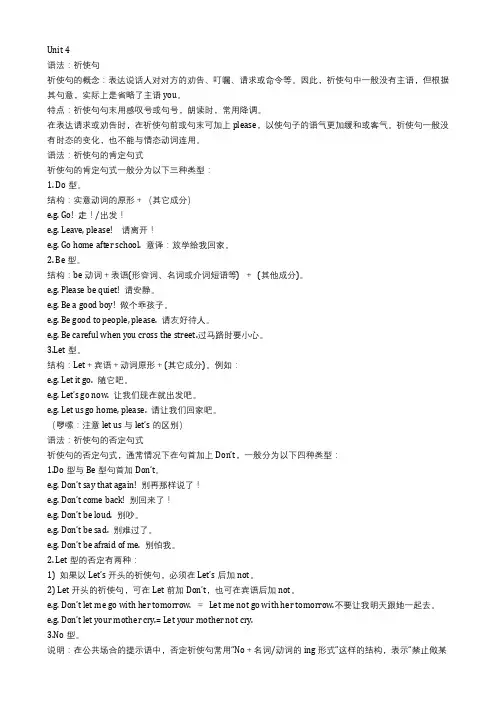
语法:祈使句祈使句的概念:表达说话人对对方的劝告、叮嘱、请求或命令等。
因此,祈使句中一般没有主语,但根据其句意,实际上是省略了主语you。
特点:祈使句句末用感叹号或句号,朗读时,常用降调。
在表达请求或劝告时,在祈使句前或句末可加上please,以使句子的语气更加缓和或客气。
祈使句一般没有时态的变化,也不能与情态动词连用。
语法:祈使句的肯定句式祈使句的肯定句式一般分为以下三种类型:1. Do型。
结构:实意动词的原形+(其它成分)e.g. Go! 走!/出发!e.g. Leave, please! 请离开!e.g. Go home after school. 意译:放学给我回家。
2. Be型。
结构:be动词+表语(形容词、名词或介词短语等) +(其他成分)。
e.g. Please be quiet! 请安静。
e.g. Be a good boy! 做个乖孩子。
e.g. Be good to people, please. 请友好待人。
e.g. Be careful when you cross the street.过马路时要小心。
3.Let型。
结构:Let+宾语+动词原形+(其它成分)。
例如:e.g. Let it go. 随它吧。
e.g. Let’s go now. 让我们现在就出发吧。
e.g. Let us go home, please. 请让我们回家吧。
(啰嗦:注意let us与let’s的区别)语法:祈使句的否定句式祈使句的否定句式,通常情况下在句首加上Don’t,一般分为以下四种类型:1.Do型与Be型句首加Don’t。
e.g. Don’t say that again! 别再那样说了!e.g. Don’t come back! 别回来了!e.g. Don’t be loud. 别吵。
e.g. Don’t be sad. 别难过了。
e.g. Don’t be afraid of me. 别怕我。
七年级下册英语四五六单元知识点
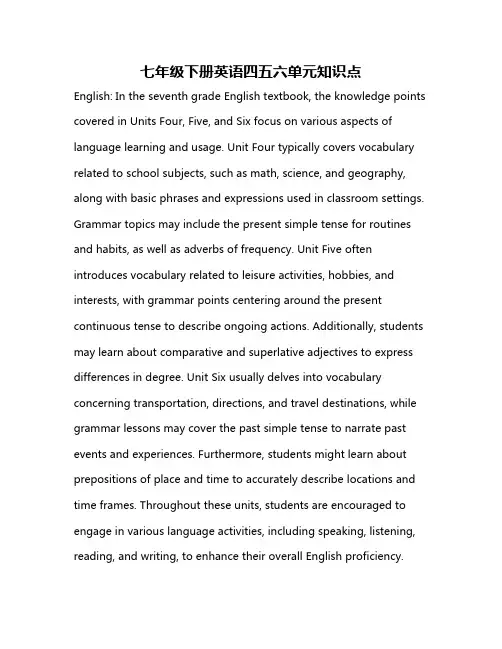
七年级下册英语四五六单元知识点English: In the seventh grade English textbook, the knowledge points covered in Units Four, Five, and Six focus on various aspects of language learning and usage. Unit Four typically covers vocabulary related to school subjects, such as math, science, and geography, along with basic phrases and expressions used in classroom settings. Grammar topics may include the present simple tense for routines and habits, as well as adverbs of frequency. Unit Five often introduces vocabulary related to leisure activities, hobbies, and interests, with grammar points centering around the present continuous tense to describe ongoing actions. Additionally, students may learn about comparative and superlative adjectives to express differences in degree. Unit Six usually delves into vocabulary concerning transportation, directions, and travel destinations, while grammar lessons may cover the past simple tense to narrate past events and experiences. Furthermore, students might learn about prepositions of place and time to accurately describe locations and time frames. Throughout these units, students are encouraged to engage in various language activities, including speaking, listening, reading, and writing, to enhance their overall English proficiency.Translated content: 在七年级英语教科书中,第四、五、六单元涵盖了语言学习和使用的各个方面的知识点。
XX七年级英语下册期末备考知识点总结(unit4-6)
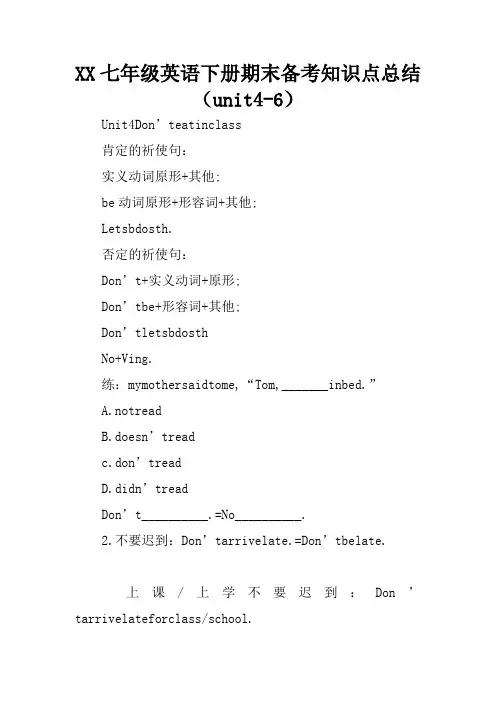
XX七年级英语下册期末备考知识点总结(unit4-6)Unit4Don’teatinclass肯定的祈使句:实义动词原形+其他;be动词原形+形容词+其他;Letsbdosth.否定的祈使句:Don’t+实义动词+原形;Don’tbe+形容词+其他;Don’tletsbdosthNo+Ving.练:mymothersaidtome,“Tom,_______inbed.”A.notreadB.doesn’treadc.don’treadD.didn’treadDon’t__________.=No__________.2.不要迟到:Don’tarrivelate.=Don’tbelate.上课/上学不要迟到:Don’tarrivelateforclass/school.3.主语省略:Don’tarrivelateforclass.主语不省略:wecan’tarrive;ateforclass.4.在学校我们必须穿校服:wehavetowearuniformsatschool.句型:不得不/必须做某事:havetodosth否定:不必做某事:don’thavetodosth穿校服:单数:wearauniform复数:wearuniforms练:–Ican’tstopsmoking,doctor.–Foryourhealth,I’mafraidyou______.A.canB.mayc.mustD.haveto5.在我家里有太多的规矩:Ihavetoomanyrulesinmyhouse.词组:太多…:toomany…6.我从来没有任何快乐:Ineverhaveanyfun.7.不要大声说话:Don’ttalkloudly.请大声说:Speakloudly,please.8.他擅长于唱歌:Heisgoodatsinging.句型:擅长于做某事:begoodatdoingsth9.表示“地点”的词组:在教室里:intheclassroom在课堂上:inclass在走廊上:inthehallways在学校里:atschool=inschool10.表示“时间”的词组:下课后:afterclass放学后:afterschool在上学的白天/晚上:onschooldays/nights 比较:atnight到晚上10点钟之前:by10o’clockp.m.11.with和;如:HelivesinBeijingwithmyparents.with戴着;如:Doyouknowthefatmanwithahat?with有着;如:It’sanoldhousewithabeautifulgarden.Unit5whydoyoulikepandas?1.–让我们先去看考拉。
2020届中考英语七年级下册Unit 4--6知识提纲
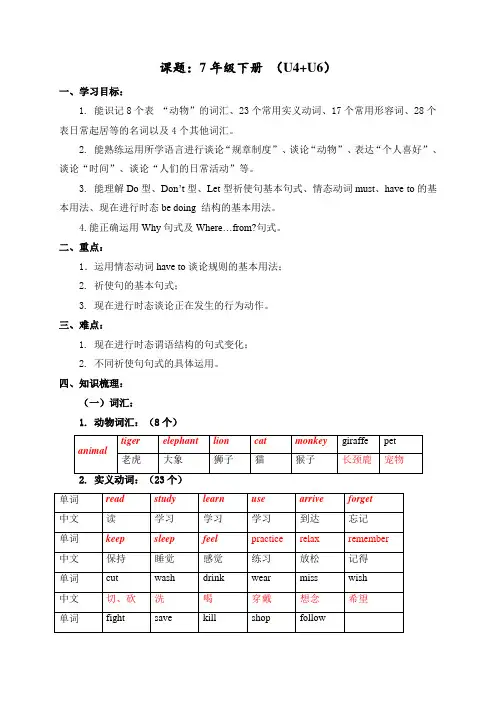
课题:7年级下册(U4+U6)一、学习目标:1. 能识记8个表“动物”的词汇、23个常用实义动词、17个常用形容词、28个表日常起居等的名词以及4个其他词汇。
2. 能熟练运用所学语言进行谈论“规章制度”、谈论“动物”、表达“个人喜好”、谈论“时间”、谈论“人们的日常活动”等。
3. 能理解Do型、Don’t型、Let型祈使句基本句式、情态动词must、have to的基本用法、现在进行时态be doing结构的基本用法。
4.能正确运用Why句式及Where…from?句式。
二、重点:1.运用情态动词have to谈论规则的基本用法;2. 祈使句的基本句式;3. 现在进行时态谈论正在发生的行为动作。
三、难点:1. 现在进行时态谓语结构的句式变化;2. 不同祈使句句式的具体运用。
四、知识梳理:(一)词汇:1. 动物词汇:(8个)中文打架拯救杀死商店跟随单词beautiful important young delicious more any中文美丽的重要的年轻的美味的更多的任何的单词quiet noisy dirty other lazy shy中文安静的嘈杂的脏的其他的懒的害羞的单词American cute sorry strict outside中文美国的可爱的遗憾的严格的外面的单词drink water tea soup Dish中文饮料水茶汤碟、盘单词place house shop supermarket kitchen中文地方房屋商店超市厨房单词pool Africa Australia state hall中文水池非洲澳大利亚州大厅单词kind tomorrow movie newspaper rule中文种类明天电影报纸规则单词man child hair tree luck中文男人孩子头发树运气单词leg race flag中文腿竞赛旗帜before down just still(二)短语搭配:on time 按时in class 在课堂上;上课时at / in school 在学校;上学cut down 砍倒in danger 处于危险中on TV 在电视上on the phone 在电话中(三)句型:1. 谈论规章制度:①There are too many rules. We have to follow them.②-- What are the rules? --We can’t arrive late for class.--We must be on time.--We have to be on time for class.--Don’t arrive late for class.③-- Can we eat in the classroom? -- Yes, we can. /No, we can’t.④-- What do you have to do? -- We have to be quiet in the library.⑤-- Do you have to wear a uniform at school?-- Yes, we do. / No, we don’t.⑥-- Does he have to eat in the dining hall? -- Yes, he does. / No, he doesn’t.2. 谈论动物,表达喜好:①Let’s see the pandas first.②-- Why do you like pandas? -- Because they’re very cute.③-- Why don’t you like the cat?-- Because she’s kind of boring. She sleeps all day.④-- Why does John like tigers? -- Because they are really cool.⑤-- What animals do you like?-- I like dogs because they’re friendly and smart.⑥-- Where are they from? -- They’re from Africa.⑦Elephants are smart animals. They can remember places with food and water.3.谈论正在进行的行为动作:①-- What are you doing? -- I’m watching TV.②-- What’s he doing? -- He’s using a computer.③-- What are they doing? -- They’re listening to a CD.④-- Are you doing your homework? -- Yes, I am. /No, I’m not.⑤-- Is she reading a newspaper? -- Yes, she is. / No, she isn’t..4. 谈论时间:①-- What time is it? -- It’s eight o’clock in the morning.②It’s 9:00 p.m. in the evening in New York, and it’s the night before the festival.③Let’s go at seven o’clock.④Come at half past six.(四)语法:1.祈使句2. Don’t run in the hallways.3.Let’s see the pandas first.2. 现在进行时态:现在进行时态表示现在(说话瞬间)正在进行或发生的动作;也可表示当前一段时间内的活动或现阶段正在进行的动作。
初中英语人教新目标版 七年级下册unit4-6基础知识复习(无答案)
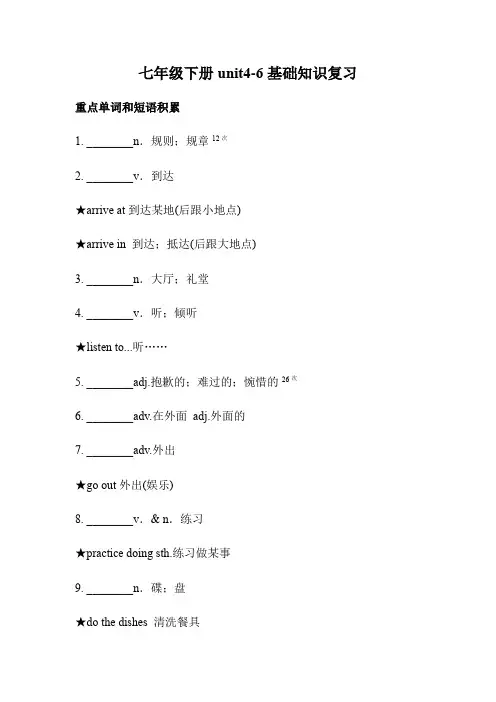
七年级下册unit4-6基础知识复习重点单词和短语积累1. ________n.规则;规章12次2. ________v.到达★arrive at到达某地(后跟小地点)★arrive in 到达;抵达(后跟大地点)3. ________n.大厅;礼堂4. ________v.听;倾听★listen to...听……5. ________adj.抱歉的;难过的;惋惜的26次6. ________adv.在外面adj.外面的7. ________adv.外出★go out外出(娱乐)8. ________v.& n.练习★practice doing sth.练习做某事9. ________n.碟;盘★do the dishes 清洗餐具10. ________ prep.& conj.在……以前adv.以前38次11. ________adj.脏的12. ________n.厨房13. ______adj.非常讨厌的;可怕14. ________adj. 严格的;严厉的★be strict with sb. 对某人要求严格★be strict in sth.对某事要求严格15. ___________v.记住;记起40次★remember to do sth. 记得做某事(未做)★remember doing sth. 记得做某事(已做)16. ________n.头发;毛发11次17. ________n.熊猫18. ________n.老虎19. ________n.大象31次20. ________n.狮子21. ________n.长颈鹿22. ________n.动物21次23. ________adj.可爱的;机灵的24. ________adj.懒散的;懒惰25. ________adj.聪明的15次26. ________n.种类42次27. ________n.宠物28. ________adj.羞怯的;腼腆的29. ________v.救;救助10次30. ________n.象征31. ________n.旗;旗帜32. ________n.地点;位置39次33. ________n.水46次34. ________adv.(坐、躺、倒)下prep.向下;沿着28次35. ________n.树19次36. ________v.杀死;弄死37. ________prep.超过;多于;在……上方Unit 6 Everyday activities(日常活动)38. ____________n.报纸★read a newspaper看报纸39. ________n.汤★make soup做汤40. ________v.洗41. ________n.电影30次★go to the movies去看电影42. ________adv.只是;恰好55次43. ________n.房子26次44. ________adv.在明天n.明天;未来45. ________n.游泳池;水池46. ______________n.超市47. ________n.竞赛48. ________v.& n.学习;研究34次49. ________n.州50. ________adj.另外的;其他的pron.另外的人(或物)53次51. ________adj.幼小的;年轻的41次52. ________v.怀念;思念;错过16次53. ________v.希望★wish sb. to do sth.希望某人做某事54.________adj.可口的;美味的★delicious food 可口的词汇拓展1. noise(n.)声音;噪音→________(adj.)吵闹的2. luck(n.)幸运;运气→________(adj.)幸运的→________(adv.)幸运地;好运地3. beauty(n.)美;美丽→________(adj.)美丽的;美好的→________(adv.)美好地;漂亮地4.Australia(n.)澳大利亚→____________(n.&adj.)澳大利亚人;澳大利亚人(的)5. Africa(n.)非洲→________(adj.&n)非洲的;非洲人的6. friend(n.)朋友→________(adj.)友好的17次→__________(n.)友谊;友情★be friendly to 对……友好7. danger(n.)危险→____________(adj.)有危险的;不安全的★out of danger脱离危险★be in (great) danger处于(极大)危险之中8. man(n.)→________(pl.)男人;人70次9. America (n.)→__________(adj.& n )美国的;美洲的;美国人;美洲人14次10. child(n.)→________(pl.)儿童73次11. wear(v.)→________(过去式)→________(过去分词)穿;戴10次★wear a pair of glasses 戴一副眼镜12. bring(v.)→________(过去式/过去分词)带来;取来12次★bring out使显现;使表现出★bring back恢复;使想起;归还13. read(v.)→______(过去式/过去分词)读;阅读→______(n.)读者73次★read a newspaper读报纸14. feel(v.)→________(过去式/过去分词)感受;觉得→________(n.)感觉;感触47次★feel like给……的感觉;感受到……★feel like doing sth.想要做某事15. follow(v.)遵循;跟随→________(adj.)下面的;接着的36次★follow the rules遵守规则16. keep(v.)→________(过去式/过去分词)保持;保留40次→________(n.)饲养员;保管人★keep...away from避免接近;远离17. learn(v.)→____________(过去式/过去分词)学习;学会60次★learn to do sth.学习做某事★learn from向……学习18. forget(v.)→________(过去式)→__________(过去分词)忘记;遗忘12次★forget to do sth. 忘记做某事(未做)★forget doing sth. 忘记做某事(已做)19. cut (v.)→________(过去式/过去分词)砍;切★cut down 砍倒★cut up 切碎★cut off 切除★cut out 删除;删去20. important(adj.)重要的→____________(反义词) 不重要的→____________(n.)重要性;重要40次21. quiet(adj.)安静的→________(adv.)轻声地;轻柔地;安静地22. south (adj.)南方的(n.)南;南方→________(adj.)南方的★in the south在南方23. fight(v.& n)→________(过去式/过去分词)打架;战斗★fight with与……打架24. sleep(v. & n.)→________(过去式/过去分词)睡觉→________(adj.)困倦的;瞌睡的→________(adj.)睡着的★fall asleep进入梦乡;睡着25. drink(n.)饮料(v.)→________(过去式)→________(过去分词)喝26. shop(n.)商店(v.)→________(现在分词)购物16次★go shopping购物好句积累(针对翻译、写作)1.Don’t eat in the classroom. You must eat in the dining hall.2.Parents and schools are strict with us sometimes, but remember, they make rules to help us.3.My dad says I can’t play basketball after school because I must do my homework.4. 不要在课堂上听音乐。
七年级下册 Units 4-6
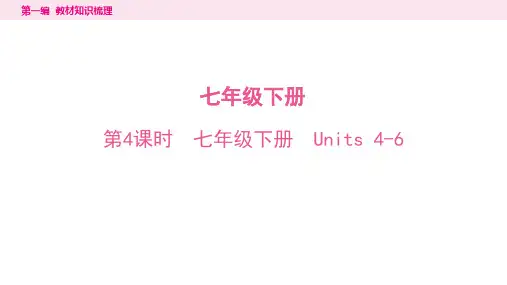
第一编 教材知识梳理
18.铺床 make (one’s) bed 19.(对某人)要求严格
be strict (with sb.) 对(某事)要求严格be strict (in sth.) 20.遵守规则 follow the rules 21.好运 good luck 22.稍微;有点儿 kind of 23.来自 be from/come from 24.迷路 get lost 25.处于(极大)危险之中
5.quiet adj.安静的 → quietly adv.安静地 6.dish n.碟;盘 → dishes (pl.) 7.noise n.噪音 → noisy adj.吵闹的 8.relax v.放松;休息 → relaxes (第三人称单数) → relaxing adj.令人放松的 → relaxed adj.放松的
[生义2]n.名次→ 例2:He got the first place this time, but he never dreamed about it. 这次他得了第一名,但他做梦也没想到。
第一编 教材知识梳理
5.water [熟义]n.水
[生义]v.浇水→
例:He went out to water the flowers just now.
→ Australian adj.澳大利亚的 n.澳大利亚人 → shier (比较级)
19.south n.南;南方
→ shiest (最高级)
→ southern adj.南方的
24.forget v.忘记;遗忘
20.Africa n.非洲
→ forgot (过去式)
→ African adj.非洲的 n.非洲人
第一编 教材知识梳理
七年级英语下 Units4-6知识点归纳
七年级(下)上半期Units 4-6知识点归纳Unit 4 I want to be an actor.1. I want to be an actor. 我想成为一名演员。
“want to be + 职业”表示“想成为一名……”如:I want to be a doctor. 我想成为一名医生。
He wants to be a teacher. 他想成为一名教师。
★want用法:1)want sth I want a basketball.2)want to do sth I want to play basketball .3)want sb to do sth. I want you to play basketball with me .2. actor 男演员。
actress 女演员。
☆一位演员要用an而不用a。
如:He’s an actor. 他是一位演员。
类似:waiter 男侍者。
waitress 女侍者3. report + er = reporter 记者。
“动词+ er = 发出动作的人”。
这是一种构词法。
如:teach 教书teacher教师run— runner write—writer作家work— worker 工人★有少数两个是加or。
如:actor visitor参观者4. policeman男警察。
☆其复数为policemenman 复数为men;woman 复数为women policewoman 复数为policewomen如:There are two policemen on the street. 街上有两位警察。
5.in hospital 住院in the /a hospital 在医院。
如:He is ill in hospital. 他生病住院了。
His father works in a hospital. 他父亲在一家医院工作。
6. What does he do? 他是做什么的?what对“职业”提问。
人教版七年级下册英语Unit 4单元知识点讲义(教师版)
七年级下册英语Unit 4知识点与语法精讲精练词汇梳理(一)完成单词梳理:名词:1. rule规则;规章 2. hallway 走廊;过道 3. hall 大厅;礼堂4. uniform 校服;制服5. dish 碟;盘6. kitchen 厨房7. luck 幸运;运气8. hair 头发;毛发动词:1. arrive 到达 2. listen 听;倾听 3. wear 穿;戴4. bring 带来;取来5. relax 放松;休息6. read 读;阅读7. feel 感受;觉得8. remember 记住;记起9. follow 遵循;跟随10. keep 保持;保留11. learn 学习;学会副词:1. out 外出形容词:1. sorry 抱歉的;难过的;惋惜的 2. important 重要的3. quiet 安静的4. dirty 脏的5. noisy 吵闹的6. terrible 非常讨厌的;可怕的7. strict 严格的;严厉的兼类词:1. fight (v/n)打架;战斗 2. outside (adv)在外面(adj)外面的3. practice (v/n)练习4. before (prep/conj)在……以前(adv)以前5. more (adj/pron)更多(的)(二)词汇变形小结:1.listen听;倾听(v.) → ___listener____ (n.)倾听者2.important 重要的(adj.) → __importance___ (n.)重要性→ __importantly__ (adv.重要地)3.quiet 安安安(adj.)→ ___quietly____(adv.)安静地4.dish 安安安(n.) →____dishes____(安安)5.more 安安安(adj/pron.) → ___many/much___ (adj.)安安6.noisy 吵闹的(adj.) → ___noise____ (n.) 噪音7.relax 安安安安安(v.) → ___relaxing____ (adj.)安安安安安 → ___relaxed____ (adj.)安安安8.read 安(v.) → ____reader____ (n.)安安安9.terrible 安安安(adj.) → ___terribly____ (adv.) 可恶地10.feel 感受;觉得(v.) → ___feeling_____ (n.) 感觉11.luck 幸运;运气(n.) → ____lucky_____ (adj.) 幸运的→ ___luckily____ (adv.) 幸运地12.keep 保持;保留(v.) → ____keeper____ (n.) 保管人;饲养员【练一练】用所给词的适当形式填空1.We don’t like these ____rules_____ (rule). They are too strict.2.Ling Ling often helps her mother do the ____dishes____ (dish) after dinner.3.Look at the sign on the wall, “Be ____quiet_____ (quietly) in the library!”4.Mr. Green is very busy. He can’t ____relax_____ (relaxing) even on weekends.5.David has to do his homework ____first_____ (one) when he is at home.6.Please don’t be ____noisy_____ (noise). The baby is sleeping.7.Listening to music can make us feel ____relaxed____ (relax).8.It is __important___ (importance) for students to listen carefully in class.9.Tom always ___arrives____ (arrive) at school ahead of time(提前). He is a good student.10.He is always ready to help others and he thinks ____more____ (much) of others than himself.(三)短语攻关:(be) on time 准时in the dining hall 在餐厅里listen to music 听音乐in class 在课堂上a lot of 许多;很多bring ... to ... 把……带到……have to 必须;不得不school uniform 校服keep/be quiet 保持安静go out 外出(娱乐)do the dishes 清洗餐具help sb. do sth. 帮助某人做某事learn to do sth. 学着去做某事make rules 制定规章制度make one’s bed 铺床good luck 祝你好运be strict (with sb.) (对某人)要求严格follow the rules 遵守规则知识点梳理1. Don’t arrive late for class. 上课不要迟到。
中考英语复习 七年级(下) Units 4~6
七年级(下) Units 4~6 (2)与forget用法相同的词还有:
返回目录
七年级(下) Units 4~6
返回目录
对点专练
water take
七年级(下) Units 4~6
返回目录
考点 2 forget的用法 教材例句:People say that “an elephant never forgets”.人们说,“大象永远不会忘记。”(Unit 5 P29)
考点精讲 【联想】forget(v.)→forgot(过去式)→forgotten(过去分词)
七年级(下) Units 4~6 【联想】forget(v.)→forgot(过去式)→forgotten(过去分词)
返回目录
如:Don't forget to write down the correct answers next to the mistakes. 别忘记在错误的旁边写下正确的答案。[外研八(上)Module 1 Unit 13 P2] I forget borrowing the book from you last week.我忘了上周向你借了 这本书。
3. It's always a useful way to tell your sadness to others like your parents or best friends rather than keep it to __y_o_u_r_s_e_l_f __. 4. I go running every day. I think it's a good habit. It keeps me _h_e_a_l_th__y_. 5. Nothing can keep you from _g_e_t_ti_n_g__ what you want. You are the one to
人教版初一英语下册期末备考知识点总结:unit4-6
人教版初一英语下册期末备考知识点总结:unit4-6每天坚持整理知识点,到考试时才能方便复习。
为大家整理了初一英语下册期末备考知识点总结,供大家参考阅读。
Unit 4 Don’t eat in class 肯定的祈使句: (1) 实义动词原形+其他; (2) be动词原形+形容词+其他; (3) Let sb do sth. 否定的祈使句: (1) Don’t+实义动词+原形; (2) Don’t be+形容词+其他; (3) Don’t let sb do sth (4) No+Ving. 练:(1) My mother said to me, Tom, _______ in bed.” A. not read B. doesn’t read C. don’t read D. didn’t read (2) Don’t __________ (fight). = No __________ (fight). 2. 不要迟到:Don’t arrive late. = Don’t be late. (arrive = be) 上课/上学不要迟到:Don’t arrive (be) late for class/school. 3. 主语省略(无主语):Don’t arrive late for class. 主语不省略(有主语):We can’t arrive ;ate for class. 4. 在学校我们必须穿校服:We have to wear uniforms at school. 句型:不得不/必须做某事:have to do sth 否定:不必做某事:don’t have to do sth 穿校服:单数:wear a uniform 复数:wear uniforms 练:(1) – I can’t stop smoking, doctor. – For your health, I’m afraid you ______. A. can B. may C. must D. have to。
- 1、下载文档前请自行甄别文档内容的完整性,平台不提供额外的编辑、内容补充、找答案等附加服务。
- 2、"仅部分预览"的文档,不可在线预览部分如存在完整性等问题,可反馈申请退款(可完整预览的文档不适用该条件!)。
- 3、如文档侵犯您的权益,请联系客服反馈,我们会尽快为您处理(人工客服工作时间:9:00-18:30)。
Unit 4 Don’t eat in class. 1. 祈使句的构成和用法 概念:祈使句是用来表示请求、命令、叮嘱、邀请、劝告等的句子。 结构:祈使句一般以动词原形开头,句末用句号或感叹号。
a) Do型祈使句 肯定结构:动词原形+宾语+其它 否定结构:Don’t+动词原形+宾语 Open the door.开门 Don’t play soccer in the classroom.不要在教室里踢足球。
b) Be型祈使句 肯定结构:Be+表语 否定结构:Don’t+be+表语 Be careful next time!下次要细心! Don’t be late for school.上学不要迟到。
c) Let型祈使句 肯定结构:Let+宾语+动词原形+其它 否定结构:Don’t+let+宾语+动词原形+其它 Let’s not+动词原形+其它 Let’s go home.我们回家吧。 Don’t let him go shopping.不要让他去购物。
d) No型祈使句 结构:No+动词ing 或 No+名词。这种结构的祈使句一般用来表示禁止。 No talking禁止讲话(=Don’t talk=Stop talking) No photos禁止拍照(=Don’t take photos)
2. 短语 go out外出(娱乐) You can’t go out on school nights.在上学的晚上你不能出去(玩)。 take out掏出,取出 Please take out a piece of paper.请拿出一张纸。 do the dishes=wash the dishes清洗餐具 Please wash the dishes after dinner.晚饭后请清洗餐具。 think about sth考虑 Let’s think about the fruit and vegetables.让我们考虑一下水果和蔬菜。 have fun=have a good time玩得高兴 Have fun.玩得开心! good luck(to sb)祝(某人)好运 Wish you good luck.=Good luck to you.祝你好运。 sb be lucky某人运气好 She is lucky.她运气好。 wait for sb等待某人 I am waiting for you.我一直在等你。 arrive late for=be late for为…而迟到 Don’t arrive late for work.上班不要迟到。 fight with sb和某人大家 Don’t fight with your classmates. 不要和你的同学打架。 make friends交朋友 I want to make friends with you.我想和你交朋友。 make sure确信 Please make sure he is at home.请确认他在家。 make one’s bed铺床 Every morning I must make my bed.每天早上我必须铺床。 make noise制造噪音 Don’t make noise.不要制造噪音。 keep quiet=be quiet保持安静 Keep quiet, please.请保持安静。=Please keep quiet. keep healthy保持健康 Running can keep us healthy.跑步能保持我们健康。 keep cool保持冷静 Keep cool, don’t fight with him.保持冷静,不要和他打架。 keep up with跟上 You must keep up with other students.你必须跟上其他学生。
3. rule规则(复数形式rules) family rules家规 school rules校规 follow the rules=obey the rules遵守规则 break the rules违反规则 make rules制定规则
4. “到达”的用法表达 get to+地方 arrive in+大地方 arrive at+小地方 reach+地方 get to school = reach school = arrive at school到达学校
注意:home, there, here是副词,因此介词to、in、at要省略,如get home到家 5. listen to、hear和sound辨析:两者都表示“听”的意思 listen 有意识地听,但不一定听到什么,强调“听”这个动作,结构“listen+to+宾语” hear强调听的结果,“听见”。 sound听起来,系动词+adj做表语
He can’t hear you because he is listening to music now.他听不见你,因为他正在听音乐。 That sounds interesting.那听起来有趣。
6. time及相关短语 表时间,不可数名词 What time is it now现在是什么时间(几点了) time 表次数,可数名词 three times三次
at the same time同时 in time及时 on time 准时 all the time一直,总是=always for the first time第一次 at times有时,偶尔
in the morning/in the afternoon/in the evening在早上/在下午/在晚上 at noon=in the middle of the day在中午 at night泛指在晚上 on school days在上学的白天 on school nights在上学的晚上
7. wear、put on和get dressed辨析 wear表“穿着、戴着”的状态。 She is wearing a red dress today.她今天穿着一件红裙子。 put on表“穿上、戴上”的动作 Please put on your coat. It is very cold outside.请穿上你的外套,外面很冷。 get dressed 是 get +adj 的用法,dressed是一个过去分词充当形容词,意思是“穿好衣服的”=dress oneself
8. have to和must辨析 have to +动词原形,强调客观需要;否定形式don’t have to不必 must+动词原形,强调主观看法 Because it is raining outside, I have to take an umbrella.因为外面正在下雨,我不得不带伞。 You don’t have to get up so early.你不必这么早起床。 I must finish my homework before half past eight in the evening.我必须在晚上八点半之前完成我的家庭作业。
9. bring…to…把…带到…来∕bring…from…从…带来 Please bring your English books to school.请把英语书带到学校来。 I bring some bread from home.我从家带来了一些面包。
10. practice用法 practice+名词 I must practice the guitar every day.我每天必须练习吉他。
practice+动名词(V-ing)She practices playing the piano after dinner.她晚餐后练习弹钢琴。 11. help用法 help sb with sth/V-ing I must help my mom with housework.我必须帮助我妈妈做家务。 Can you help me with washing the dishes你能帮助我清洗餐具吗 help sb (to) do sth I need to help my students learn English.我需要帮助我的学生学习英语。
12. too many,too much,much to用法辨析 too many+可数名词复数,表示“太多” too much+不可数名词,表示“太多” much too+形容词/副词,表示“太”
There are too many rules at school.学校有太多规则。 He eats too much ice-cream他吃了太多冰激凌。 His T-shirt is much too large.他的衬衫太大了。
13. 正反义词小结 interesting, fun有趣的 boring无聊的 noisy吵闹的 (noise噪音,不可数名词) quiet安静的
unimportant不重要的 important重要的 happy高兴的 unhappy不高兴的sad伤心的 clean干净的 dirty脏的 big大的 small小的 long长的 short短的 tall高的 short矮的 new新的 old老的,旧的 fat胖的 thin,slim瘦的 outside在外面 inside在里面 friendly友好的 unfriendly不友好的
14. strict用法
